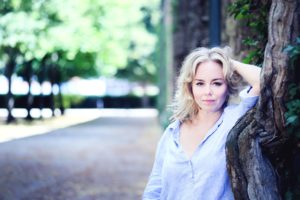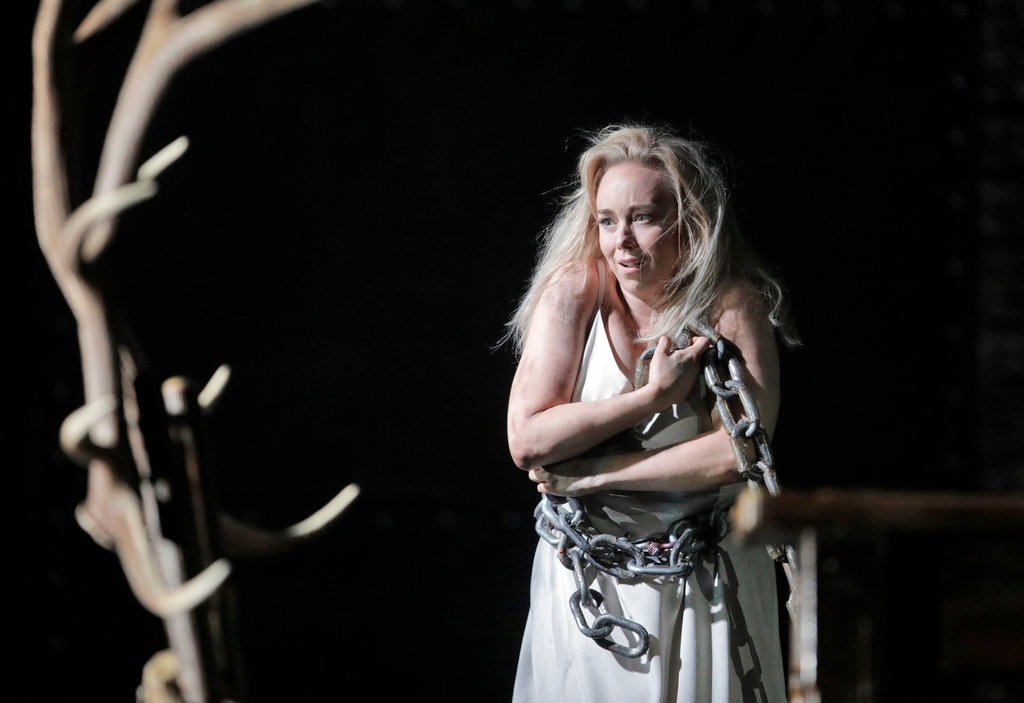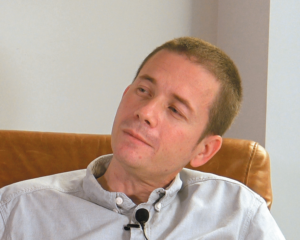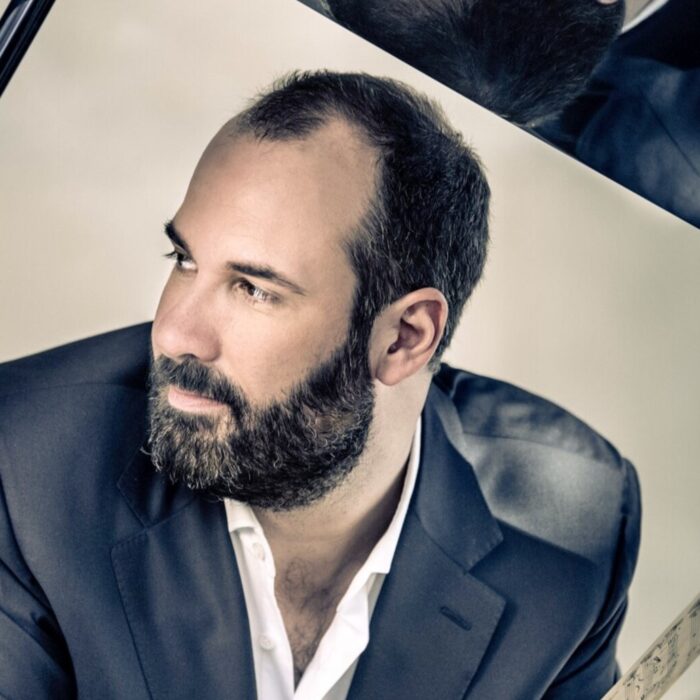
Q & A: Elisabet Strid on New Beginnings, COVID-19 and Overcoming Obstacles
By Dejan Vukosavljevic(Credit: Emelie Kroon)
When COVID-19 struck a few months back, one of the final “live” performances to take the stage was a rendition of Wagner’s “Die Walküre” in Sweden. Among the performers in that production was dramatic soprano Elisabet Strid, who took on the role of Sieglinde.
Strid, who has performed in such opera houses as the Teatro Real, Lyric Opera of Chicago, Kungliga Operan, Semperoper, Oper Leipzig, Staatsoper Stuttgart, Den Norske Opera, the Vlaamse Opera, and Opera Vlaanderen, among others, took the stage with her colleagues to an unusual circumstance they had rarely ever encountered – an empty auditorium.
“We all left our hearts and our souls on the stage of the Royal Swedish Opera on that night. I was very happy indeed to be there under the circumstances,” Strid told OperaWire.
Months later, Strid is now looking forward to getting back to live performances for audiences. The soprano, who is renowned for her interpretations in such operas as “Der Fliegende Holländer,” “Tannhäuser,” “Rusalka,” “The Queen of Spades,” and “Salome,” has recently spoke with OperaWire about life during the COVID-19 lockdown, her hopes for the new beginning, and resilience as the general positive attitude in life.
OperaWire: Let me start this conversation by asking how are you.
Elisabet Strid: I am fine, thank you. I am currently in Rügen, in Germany. It is located off the Pomeranian coast in the Baltic Sea. It is a very beautiful spa island. And I am here for the first time ever! Actually, I am very close to Sweden.
It is so gorgeous and so bright. I enjoyed the most beautiful sunset a few days ago. The weather is warm, and the beach is great. I really love it.
OW: What have you done during these challenging times to keep yourself positive and productive?
ES: I have been spending lots of time at my home, in my garden. That was not possible up to now, as I have been very busy with the performances, and also very busy traveling between the performances. I see it as something positive overall. Yes, I lost lots of work and opportunities to sing in new and exciting places in the last five months. I just said to myself that now would be the time to fully and properly enjoy my home.
I have been seeing more of my friends and family, and working in calm on both the old and new things. And that has become a source of the new energy and inspiration for me. You know, in order to successfully create the new characters, you need to talk to the people. Sitting alone in the hotel room between the rehearsals does not help much. So this has been very welcome in that way.
I have been also practicing a lot and using this time to work on my knowledge of the Italian language. As I am preparing the new roles, this is absolutely necessary for me to do. I am supposed to perform in Italy in November, and also in May 2021. Obviously nobody can tell for sure what is going to happen, this massive uncertainty is around us, but that is the plan.
As I have my own house with the garden, I can literally sing whenever I want without disturbing anyone. I can sing even in the middle of the night. Sometimes the inspiration comes late in the day.
OW: How do you feel about the massive free streaming offerings? Did you watch any of them yourself?
ES: No, I have not. I did not watch even my own streamings. It is not that easy for me to watch myself onstage. In general, I see the two sides of this.
Obviously, opera is the kind of art that should be enjoyed live, during live performances. No streaming can replace the experience of the live performance, ever. Opera is also a visceral experience.
On the other hand, I do understand what the opera houses were trying to do. During the very severe lockdowns, opera lovers needed some comforting experience, something to lift their spirits. In my opinion, that was a noble thing to do. I hope that we will be able to go back to the live performances soon, and to really feel, not just hear the live opera.
OW: What do you think could be the greatest impact of the pandemic on your life and work?
ES: I am a dramatic soprano, and I sing lots of Wagnerian roles. These operas last for more than four or five hours with intermissions. They also frequently involve big choruses. Naturally, I am a bit worried about the future of these types of very lengthy performances. I am curious about the ways that the opera houses could deploy in order to keep all of us – the artists, members of the orchestras, and choruses safe. And I certainly wonder if the opera houses will find the courage to stage these big and very lengthy operas.
For example, I can see that very serious efforts have been undertaken in Berlin, for the rehearsals of “Die Walküre” at the Deutsche Oper. The Salzburg Festival has also deployed very serious measures in order to keep both the artists and the audiences safe. This soothes my soul very much and gives me hope for the future. If the governments support the arts now, we might be able to find a way through this pandemic and save the arts.
I envision the problems regarding travelling, especially the very long intercontinental flights. There would be many more security rules, and people might find that too uncomfortable. This also could have a great impact on my work.
On the positive note, I believe that people will become much more aware of their health now, and lead a healthy and balanced way of life. Using face masks will protect not just from COVID-19, but the other respiratory illnesses as well. And that is already the biggest possible impact of the pandemic on not just my life, but everyone’s life.
OW: What are the sources of your internal energy in order to overcome this?
ES: I have this very nice and cozy house with the garden and the old red furniture in it. I enjoy it very much. As I am very romantic, sometimes I wish this house to serve as the staging for some of my operas, for example, “Tannhäuser.” It is a dreamy environment. I enjoy being in my garden, to see my flowers growing. It is definitely a very big source of my internal energy.
And I am the lucky friend of my 13-year old puppy, Selma. I have been separated from Selma for the last three years. My constantly busy way of life simply did not make it possible, that Selma stays with me. But we have been reunited since March. I am spending a lot of time with her now.
My partner lives in Germany. We have never spent so much time together until the pandemic. That is another dimension, which is very important for me. It might be ironic, but from the family point of view, as well as emotionally, the pandemic brought me a much calmer way of life. It has become quieter, and I have been able to spend much more time with my family.
OW: Sweden did not choose the rigorous lockdown, but opted instead for much looser measures. How did you feel about it?
ES: I have never felt unprotected. I actually appreciate the freedom that the Swedish government gave to the citizens of Sweden. From what I was able to see, the great majority of the citizens were actually good citizens, and they really cared about their own health, as well as the health of others.
I saw that people did respect the recommendations regarding social distancing. Also, some chose to stay in their homes instead of going to the holidays. And many also choose to work from home, just like in other countries. Basically, the citizens of Sweden really behaved conscientiously.
Tragically, the government was not able to protect the elderly people, and that was the big catastrophe in Sweden. Caring homes were particularly heavily struck by the COVID-19 pandemic, and that was really a tragedy. So many elderly people died.
Another question might arise here, and that would be how Sweden allowed this to happen at all. I have been thinking about it a lot, and I have to admit that I don’t have a good answer to that question. The only thing that comes to my mind is the initial unawareness about the seriousness of the situation. That inevitably led to the somewhat poor organization of the complete protective system that must be deployed in these situations.
Thus, the death rate in nursing homes was unbelievably high. It really breaks my heart.
On the other hand, our schools remained open, and we have not had any issues with that. Children and the younger people managed to escape the very serious outcomes, as the great majority in those groups remained uninfected.
OW: Being a freelancer, you lost some work in the last five months. What do you think about the financial, and the overall support for the culture sector in Sweden?
ES: Well, I didn’t get any money from the government up to this moment. I have worked outside Sweden for many years as an international opera singer. In that way, I have lost the opportunity to have a deeper connection with the support system in Sweden, and I feel the consequences now. I was forced to use my savings in order to survive, and that is fine for the time being. Of course, much depends on how fast we would be able to go back onstage.
I think there is this general problem in Sweden regarding the support for the arts. The government is the largest funding source for the big theatres and opera houses. However, smaller companies face a really tough time, as they don’t enjoy so much support from the government. They were also forced to lay off many of their artists and staff. That is all very sad, and this huge uncertainty definitely makes the situation much worse.
The economic model doesn’t seem feasible either, as for the time being only up to 50 spectators are allowed in the audiences. And that is clearly not enough for the theaters and opera houses in order to survive.
OW: The pandemic didn’t stop you from traveling. You traveled to Leipzig and Berlin, even during the early stages of the pandemic. Did you have any fears?
ES: Well, the only option to travel from Sweden to Germany at that time was via a ferry. Very few people were traveling, so the ferry was almost empty. I literally had no opportunity to be close to anyone. And in Germany, the trains were also almost empty. It was a very strange experience because I got used to being surrounded by many people when traveling. But that was not the case in April and May. And that also made the situation much easier for me.
I have used protection, and I kept the social distance at all times. So I did not have any fears. I had concerns, the situation was serious, but not fears.

(Credit: Cory Weaver/Lyric Opera of Chicago)
OW: You were slated to sing your signature role – Sieglinde in Wagner’s “Die Walküre“ at the Royal Swedish Opera on March 14. The performance was not canceled but instead went on without the audiences. It was also broadcast live. How did you feel in an empty opera house?
ES: I have to say that I was not scared. I just tried to completely focus on the performance and give my best in an already difficult situation. It was a great cast, with Iréne Theorin and Greer Grimsley, among others. I had an opportunity to work with the great singers, and to enjoy my Sieglinde that I love so much.
Speaking about the empty theater, that was really sad. Somehow, I intimately felt that this rendition of “Die Walküre” at the Royal Swedish Opera would be the last live performance for a very long time. Truth to be told, things have already been very emotional for all of us onstage. The orchestra went out of the pit and was located onstage, so it was a semi-staged production. We had to adjust quickly to make it work. The day before the performance I was almost certain that it would be canceled, but we somehow pulled it out.
I think that the strangest moment happened after the opera had ended. We were just standing on the stage, and it was totally quiet. Dark and quiet. We all left our hearts and our souls on the stage of the Royal Swedish Opera on that night. I was very happy indeed to be there under the circumstances.
OW: You are now scheduled to return to the stage in November, in the role of Chrysothemis in Strauss’ “Elektra” at the Teatro Massimo di Palermo. What are your expectations in the light of the COVID-19 situation?
ES: I have been looking very much forward to participate in this production, with Iréne Theorin in the title role. Of course, things have been uncertain for a long time now, and nobody can really say what will happen in three months. Ten days ago we have received the news that the Teatro Massimo di Palermo would adjust the performances of “Elektra” to the current circumstances. I do not know the details at the moment, but it certainly will not be the fully staged production.
We will have fewer performances as the result, and obviously not so much close contact between the performers. I am naturally very happy that the opera house is making such efforts in order to keep the production alive. I don’t mind the semistaged version or the concert performance of the opera. I am only very happy to be the part of it.
From the artistic side, singing Chrysothemis brings me much joy. I have not sung the role since 2016. I have just recently reopened the score of “Elektra,” and the happiness was overwhelming. Strauss’ music is special in so many ways. It is a bit difficult to bring all of my heart and soul into these efforts, given the uncertainty. But I am very grateful for the opportunity.
I am also preparing the role of Minnie in Puccini’s “La Fanciulla del West.” That will be my first Minnie. I am doing my best to overcome these obstacles and give the best of me for the preparations of the roles.
OW: What do you expect to become the “new normal” post-pandemic, especially regarding your job?
ES: I have the most honest expectations that I will be able to go back to the big productions of Wagner operas, and other productions that I am involved in, or will be involved in the future. Obviously there will be more rules in order to protect the artists and the audiences, but I do not think that should become a big obstacle.
Current rehearsals for the production of “Die Walküre” at the Deutsche Oper in Berlin are really the first test of our ability to go back to these types of productions. I am following those developments closely. I also hope that the other opera houses will devise their COVID-19 safety plans carefully, and proceed accordingly. That awareness could become the new normal in the world of opera.
OW: What gets you up in the morning?
ES: To offer a very short answer – these are love, art, and a new day. In May, during one concert performance, I sang that famous Tosca’s aria “Vissi d’arte, vissi d’amore.” I live for love, and I live for the arts. For my family, my home and my garden. For Selma.
I am very grateful to be alive and grateful to be healthy. Generally, I am a very positive and optimistic person. I try to overcome the obstacles that each day brings. That is not always easy, of course, but I keep pushing through, no matter the circumstances.



